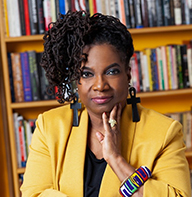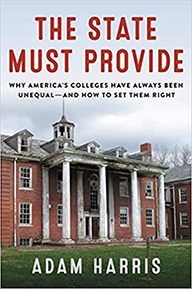The State Must Provide: Why America’s Colleges Have Always Been Unequal—And How To Set Them Right By Adam Harris.
Reviewed by Nkechi Taifa
Seen in isolation, recent problems at HBCUs, Medgar Evers College in New York City and Barber-Scotia College in North Carolina can be easily viewed within the context of the problems all higher education students are having with see-sawing enrollment and continuing pandemic problems. And if you wanted to add the conflict that Nikole Hannah-Jones had with the Board of Trustees at the predominately white University of North Carolina, that could be just seen as a rogue board controlled by political conservatives. So, it can be easy to write race out of this dialogue, or at least downplay it.
But Adam Harris, a staff writer at The Atlantic, did the deep digging and has exposed the constant drumbeat of white supremacy that is at the core of controlling white and Black higher education in America. The State Must Provide is right on time as the state of Maryland pays a form of reparations to its four HBCUs as the result of a lawsuit. Harris, however, takes a long time to get to this kind of direct action, waiting until his final pages to get to the controversial “R” word. But he does so because he has to show the historic injustice that is behind every old, dilapidated Historically Black College and University building and non-manicured lawn.
Harris finds a sad relationship: recounting a history where America’s universities “have never given Black people an equal chance to succeed,” he finds that the less Black students you have at a given university, then and now, the better your funding from the state. He puts on history’s chalkboard the long division—how across America in the 19th and 20th centuries statehouses pinched pennies with Black colleges while opening up the wallet to white land-grant colleges because the latter’s goal was providing top “training [to] the white workforce.” So, the fix was in at the Reconstruction-Jim Crow-apartheid genesis, with built-in victim-blaming under the guise of freedom of choice during post-Civil-Rights-Movement desegregation. But who chooses to be underfunded and discriminated at every turn as the trans-generational result of states’ rights?
What Harris writes about Mississippi can apply to several other states. “Most state flagship universities have fewer than 10 percent Black enrollment, but more than 50 percent of the students who graduated from high school in Mississippi in 2016 were Black, and fewer than 12 percent of the students enrolled at the University of Mississippi were. Of course, racial composition will not be a 1:1 match at every flagship university, but there are only seven states—West Virginia, New Mexico, Montana, Idaho, Wyoming, Oregon, and South Dakota—where the percentages even come close. Less than 5 percent of the total population in each of those states is Black.” So Black students, not their states’ priority, promptly and correctly turn to the places that will propel them forward.
(It’s a well-known tale this writer understands, as a proud native and current resident of the non-state District of Columbia and a 20th century graduate of Howard University, the city’s greatest Black institution almost two centuries before the Smithsonian’s Black museum came to town. Interestingly, Howard missed this historic statehouse turmoil because of a very important reason: it’s funded by a renewable act of Congress.)
Adam Harris’ chronicle rides into the contemporary, stopping at the successful 2019 campaign to save Bennett College, a woman’s liberal arts HBCU in North Carolina, from closure. So, in this socio-historical context provided so deftly and thoroughly by Harris, Mackenzie Scott’s recent financial gifts to HBCUs are more acts of racial justice than of mere philanthropy.
Harris has done for American education what his predecessor at The Atlantic, Ta-Nehisi Coates, did for housing in the latter’s now-famous reparations article: he has freed historic Black oppression from anecdote. This well-researched, well-written work accomplishes the credo of the historian’s craft: making the present clearer. It is this reviewers’ hope that it accomplishes Black history’s not-so-hidden priority: lighting fires in the hearts of activists across the nation—in this case, inspiring them to help their local and regional HBCU college administrators to make sure our communities get what they are owed.


